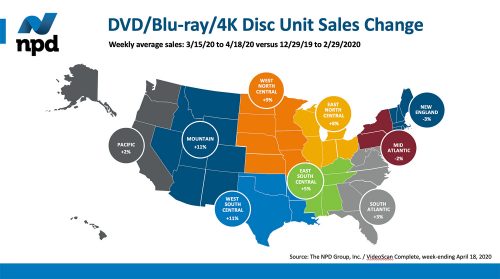U.S. weekly Netflix usage up 72% since COVID-19 pandemic began
Monday, May 4th, 2020
Average Weekly Netflix Usage Rose 72% in the U.S. Since COVID-19 Pandemic Began, The NPD Group Says
Share Article
- More populous regions with higher COVID-19 caseloads experienced higher streaming growth, as DVD and Blu-ray Disc sales rose in areas with less density and fewer cases
PORT WASHINGTON, N.Y. — Since shelter at home orders were first announced in the United States, there has been a 72 percent increase in the number of Netflix subscriber profiles that were used to stream video each week. Residents in the Tri-State region of New York, New Jersey, and Connecticut, with some of the strictest shelter-at-home policies, spent significantly more time streaming on Netflix than the rest of the country, according to The NPD Group.
“While entertainment is not essential for survival, it’s still an essential way to stay sane, while people shelter at home,” said John Buffone, executive director, industry analyst at The NPD Group. “There have been notable streaming video preference shifts toward escapist titles and family programming that viewers are bingeing on to keep themselves entertained.”
Using information from its Subscription Video Track service, NPD compared the NY Tri-State region with the remainder of the United States. While these two geographic areas experienced similar double-digit increases in the average number of weekly viewing profiles, there was a distinct difference in time spent streaming content from Netflix. In the Tri-State area, the average amount of time each Netflix profile was used to stream video on a weekly basis rose 37 percent after shelter-in-place orders were issued on March 21, 2020, which is 10 percentage points higher than the rest of the country.
Faltering DVD sales boosted in areas with less population
According to the most recent data from NPD, less densely populated regions in the U.S., often with lower numbers of COVID-19 cases and less stringent stay-at-home policies, drove up DVD and Blu-ray Disc unit sales growth. Since the middle of March 2020, video disc sales in the populous, and hardest hit, areas of New England and the Mid-Atlantic Census Divisions were down 2 percent and 3 percent, respectively, compared to the average weekly sales in January and February. Comparatively, disc unit sales in less populated areas with fewer than a million residents increased nearly two times faster than more densely populated areas.
“It’s very encouraging to see so much DVD and Blu-ray Disc sales activity happening in these regions, demonstrating consumers’ appetite for quality entertainment,” Buffone said.
Latest News
- Tata Motors selects HARMAN Automotive's in-vehicle app store
- Media Distillery to power Swisscom ad-free replay product
- MagentaTV strengthens addressable TV business with Equativ
- Deutsche Telekom selects Broadpeak Cloud DVR solution for MagentaTV
- Nexxen empowers Australian advertisers using VIDAA ACR data
- TargetVideo integrates AI for video content categorization
